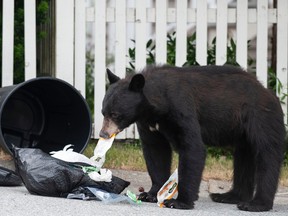In 2023, British Columbia conservation officials killed a record 603 black bears, up from 493 the previous year.

Article content
With spring underway, black bears across BC have awakened from hibernation to search for food sources. But for those who can’t find enough grass or berries, chewing trash from a trash can on a residential property has proven deadly.
In 2023, British Columbia conservation officials killed a record 603 black bears. compared to 493 the previous year, according to provincial data, the highest number recorded in the last decade.
Advertisement 2
Article content
Article content
While some wildlife conservationists say the conservation service is to blame for the destruction of black bears and needs independent oversight, the provincial agency has attributed the problem to an increase in human conflict with the animals due to uncontrolled external attractants, such as garbage and food scraps.
“Wipping out any bear is an outcome we work very hard to prevent,” said David Karn, Ministry of Environment and Climate Change Strategy.
In the last decade, reports of black bears submitted to the conservation service have increased dramatically. Provincial data shows that the annual average of calls went from 17,500 between 2014 and 2016, to an average of 24,500 for each of the last three years.
Karn said the provincial agency received more than 27,000 reports of human-wildlife conflicts with black bears last year, and 27 per cent involved the animals finding trash in residential areas.
“Only two percent of those calls led to conservation officials euthanizing bears to ensure public safety.”
The sharp rise in black bear deaths prompted North Vancouver District Council to speak out last month about wildlife conservation groups and ask the Union of British Columbia Municipalities to pass a resolution urging the establishment of a board independent public authority to supervise conservation officers, whose mandate falls under the police law.
Article content
Advertisement 3
Article content
Ellie Lamb, wildlife advisor for Pacific Wild, said some black bears killed at the discretion of conservation officials do not pose a threat to public safety, especially orphaned cubs.

Last year, snow and water supplies were below average and, specifically for bears, drought conditions may impact food supplies, says BC’s Ministry of Water, Land and Resource Management.
“When bears become conditioned to eating unnatural foods and show minimal fear of people, they are no longer candidates for rehabilitation or relocation, as the risk to public safety is simply too great.”
Adam Ford, associate professor and Canada Research Chair in Wildlife Restoration Ecology at the University of BC, disagrees that conservation officials take the blame.
“I don’t think we blame doctors when people die from cancer,” Ford said. “Conservation officials are at the end of a very complicated problem.”
Since the rate of destruction of black bears by conservation officials in British Columbia has remained stable over the past decade, Ford says the answer to the problem lies in data that the province does not collect.
Advertisement 4
Article content
“We need to look at why there are more reports: is it because there are more bears than there used to be, or is it because the behavior of humans or black bears is changing?”
Both Ford and Holly Reisner, executive director of the North Shore Black Bear Society, believe that increased enforcement for residents who do not secure their attractants would reduce black bear deaths.
“The natural behavior of bears is to roam their territory in search of food… With their incredibly strong sense of smell, they will smell food in a freezer located in your garage or in your fruit tree – that is your responsibility to manage” Reisner said.
The District of North Vancouver is one of the few municipalities with bylaws to prevent human-wildlife conflicts. Residents who do not take out their trash for disposal after 5 a.m. or who do not store food scraps on their property can face fines of up to $500.
“This type of solution is only handled by municipal bylaws, as we don’t expect conservation officers to go out to individual communities to make sure people aren’t taking out their trash too early,” Ford added.
Advertisement 5
Article content
Ford said that of all the municipalities in British Columbia, only 10 have Bear Smart status, for which a number of criteria are met, including creating a bear-human conflict management plan, implementing continuing education and developing a bear-proof waste management plan.
“Addressing the human side of this problem requires a multi-agency governance approach that we simply have not implemented in British Columbia”
– With files from Tiffany Crawford
Recommended by Editorial
-

British Columbia conservation officials should be held accountable for record number of black bears killed, advocates say
-

British Columbia conservation officials should be held accountable for record number of black bears killed, advocates say
Bookmark our website and support our journalism: Don’t miss the news you need to know – add VancouverSun.com and LaProvincia.com to your favorites and subscribe to our newsletters here.
You can also support our journalism by becoming a digital subscriber — for just $14 a month, you can get unlimited access to The Vancouver Sun, The Province, National Post and 13 other Canadian news sites. Support us by subscribing today: The Vancouver Sun | The province.
Article content

